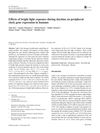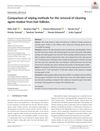 18 citations,
June 2019 in “Twin research and human genetics”
18 citations,
June 2019 in “Twin research and human genetics” The 25Up study collected extensive data on mental disorders and related factors in Australian twins and siblings to investigate the genetics of psychiatric illnesses.
 17 citations,
April 2016 in “Journal of Investigative Dermatology”
17 citations,
April 2016 in “Journal of Investigative Dermatology” KB2115 (eprotirome) can safely extend the hair growth phase without damaging cells or changing hair color.
[object Object]  16 citations,
August 2014 in “Colloids and surfaces. B, Biointerfaces”
16 citations,
August 2014 in “Colloids and surfaces. B, Biointerfaces” Lipid-coated silica nanoparticles penetrate human skin more deeply than bare silica nanoparticles.
 16 citations,
August 2014 in “Archives of Pharmacal Research”
16 citations,
August 2014 in “Archives of Pharmacal Research” Special nanoparticles increased skin absorption of hair loss treatments with fewer side effects.
 13 citations,
January 2010 in “Advances in Biochemical Engineering / Biotechnology”
13 citations,
January 2010 in “Advances in Biochemical Engineering / Biotechnology” Understanding hair biology is key to developing better treatments for hair and scalp issues.
 12 citations,
July 2017 in “Scientific reports”
12 citations,
July 2017 in “Scientific reports” Researchers developed a way to study human body clocks using hair tissue, which works similarly in both healthy and dementia patients.
 12 citations,
July 2017 in “Journal of cosmetic dermatology”
12 citations,
July 2017 in “Journal of cosmetic dermatology” Infrared thermography, especially with dermoscopy, improves accuracy in diagnosing active hair loss due to inflammation.
 11 citations,
October 2018 in “Hormone and Metabolic Research”
11 citations,
October 2018 in “Hormone and Metabolic Research” Women with PCOS have similar bone density to healthy women, but those who are obese have higher bone density at some body sites.
 10 citations,
August 2015 in “Journal of biophotonics”
10 citations,
August 2015 in “Journal of biophotonics” Hair follicles help substances penetrate the skin faster and more effectively.
 10 citations,
August 2014 in “Skin research and technology”
10 citations,
August 2014 in “Skin research and technology” Sleep, testosterone levels, and a specific enzyme activity affect skin oil production in women.
 10 citations,
October 2009 in “Clinical Therapeutics”
10 citations,
October 2009 in “Clinical Therapeutics” Finasteride 5-mg oral disintegrating tablets and standard tablets are bioequivalent in healthy adult male Han Chinese volunteers.
 9 citations,
October 1993 in “The Journal of Clinical Pharmacology”
9 citations,
October 1993 in “The Journal of Clinical Pharmacology” Finasteride doesn't affect antipyrine metabolism, so interactions with cytochrome P-450 enzyme drugs are unlikely.
 8 citations,
March 2016 in “Hair transplant forum international”
8 citations,
March 2016 in “Hair transplant forum international” The new FUE device improves hair transplant safety and efficiency.
 7 citations,
January 2012 in “International Journal of Trichology”
7 citations,
January 2012 in “International Journal of Trichology” A man with Woolly Hair Syndrome had very curly, fragile hair, and doctors used a special scalp examination to diagnose him without invasive tests.
 5 citations,
May 2020 in “Pharmaceutical Research”
5 citations,
May 2020 in “Pharmaceutical Research” Heat and chemicals improve finasteride delivery to scalp and hair follicles, potentially enhancing treatment for hair loss.
 5 citations,
December 2016 in “International journal of biometeorology”
5 citations,
December 2016 in “International journal of biometeorology” Bright light during the day doesn't change most human clock genes but may slightly increase Rev-erb-ß.
 4 citations,
July 2020 in “International Journal of Cosmetic Science”
4 citations,
July 2020 in “International Journal of Cosmetic Science” All hair removal methods irritate underarm skin and cause dryness, with shaving being less irritating but more drying than plucking or waxing.
 4 citations,
May 2007 in “Oral and Maxillofacial Surgery Clinics of North America”
4 citations,
May 2007 in “Oral and Maxillofacial Surgery Clinics of North America” Understanding gender differences and individual patient characteristics is essential for optimal cosmetic surgery outcomes.
 3 citations,
January 2019 in “Skin research and technology”
3 citations,
January 2019 in “Skin research and technology” All wiping methods are as effective as washing for removing cleaning agent from hair.
 3 citations,
May 2018 in “InTech eBooks”
3 citations,
May 2018 in “InTech eBooks” Animal models, especially mice, are essential for advancing hair loss research and treatment.
[object Object]  3 citations,
October 2014 in “Pharmaceutical Development and Technology”
3 citations,
October 2014 in “Pharmaceutical Development and Technology” The study found a way to improve a skin-applied minoxidil formula using a specific design method.
 2 citations,
November 2023 in “Frontiers in microbiology”
2 citations,
November 2023 in “Frontiers in microbiology” The health of the gut may be important in developing new ways to prevent, diagnose, and treat alopecia areata.
 2 citations,
August 2021 in “Journal of Turkish sleep medicine”
2 citations,
August 2021 in “Journal of Turkish sleep medicine” People with polycystic ovary syndrome are more likely to have poor sleep, restless legs syndrome, anxiety, and depression.
 2 citations,
April 2021 in “International Journal of Pharmaceutics”
2 citations,
April 2021 in “International Journal of Pharmaceutics” Serum formulations were better at delivering molecules to the hair bulb than nanoparticles.
 2 citations,
September 2012 in “Actas Dermo-Sifiliográficas”
2 citations,
September 2012 in “Actas Dermo-Sifiliográficas” Societal pressure for the perfect body leads to health risks and disorders.
 1 citations,
October 2023 in “International journal of Ayurveda and pharma research”
1 citations,
October 2023 in “International journal of Ayurveda and pharma research” Herbal medications might be safer and more effective for hair loss than synthetic treatments.
 1 citations,
March 2018 in “bioRxiv (Cold Spring Harbor Laboratory)”
1 citations,
March 2018 in “bioRxiv (Cold Spring Harbor Laboratory)” The hair treatment made hair grow faster and thicker and strengthened the hair roots.
 1 citations,
December 2013 in “Turkderm”
1 citations,
December 2013 in “Turkderm” Use of cosmeceuticals during pregnancy and breastfeeding is not recommended due to insufficient safety data.
 1 citations,
February 1999 in “Journal of Paediatrics and Child Health”
1 citations,
February 1999 in “Journal of Paediatrics and Child Health” The document concludes that each reviewed medical book is useful for its specific area in pediatric care, especially the "Neonatal Formulary" for neonatal drug information.
 December 2024 in “Asian Journal of Pharmaceutical and Clinical Research”
December 2024 in “Asian Journal of Pharmaceutical and Clinical Research” Combining synthetic and herbal treatments may help with hair loss, but more research is needed.





























